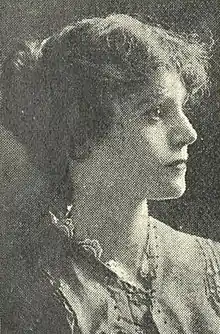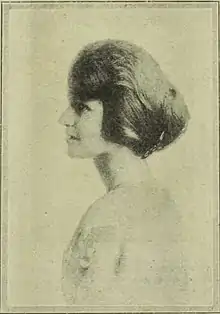Grace Ethel Martyr
Grace Ethel Martyr (1888 – 22 December 1934) was an Australian poet, short story writer and journalist. She often wrote as Ethel Martyr.
Grace Ethel Martyr | |
|---|---|
 Martyr in 1927 | |
| Born | 1888 Ballarat, Victoria, Australia |
| Died | 22 December 1934 (aged 45–46) Quarry Hill, Victoria, Australia |
| Pen name |
|
Early life and education
Grace Ethel Martyr was born in Ballarat, Victoria in 1888, the only daughter of Grace Flora (née King) and James Kent Martyr and grew up in Maldon.[1] In mid-1906 she passed the University of Melbourne matriculation examination.[2]
Career
Her father worked for the Bank of New South Wales (now Westpac) throughout his career and Martyr joined that bank as a clerk for four and half years. She was forced to leave due to ill health.[1] While at the bank, she had a book of poems, Afterwards and other verses, published by the Australasian Authors' Agency.[3]
She won several prizes at the South Street Literary Awards in Ballarat; in 1918 for best patriotic poem[4] and in 1919 for best original poem.[5] In 1920 she came second to David McKee Wright in a field of 125 entries for best patriotic poem.[6]
She worked for The Bendigo Advertiser as women's editor and also ran the children's page, remaining on the job until the week before her death.[7]
She wrote many poems which were published in The Australasian,[8] The Bulletin, Australian Woman's Mirror, The Herald and Weekly Times. Her short stories appeared in The Australasian and other newspapers; she wrote 11 stories which were serialised, including one published posthumously.[9]
Journalist and poet, Zora Cross, writing as Bernice May, considered that Martyr and Tasmanian Hilda Bridges created "the most lovable and delightful small girls in our Australian literature today".[10]
Martyr wrote song lyrics which Margaret Sutherland set to music, including Songs for Children, (1929)[11] and "Two blue slippers for children's voices" (1936).[12] She also collaborated with musician William James, creating material for radio programs for children.[13]
Selected works
Poetry

- Martyr, Grace Ethel (1918). Afterwards and other verses. Australasian Author's Agency.
Serialised stories
- "Young Jimmy", Weekly Times, 1925[14]
- "The Tenby Children", The Australasian, 1925[15]
- "Four Little Girls", The Australasian, 1926[16]
- "Cinderella: A Tale of Treasure", The Australasian, 1927[17]
- "Chums at Wunnamurra", The Queenslander, 1928[18]
- "John and Judy", The Australasian, 1928[19]
- "The Apple Tree", The Australasian, 1930[20]
- "Green Timber", Weekly Times, 1930[21]
- "Fairy Gold", The Australasian, 1932[22]
- "The Happy Island", The Australasian, 1933[23]
- "The Threshold", Weekly Times, 1937[9]
Death and legacy
Martyr died at Quarry Hill, near Bendigo in Victoria on 22 December 1934. There is no record of a marriage,[7] although she was engaged to Lindsay Webb in 1911.[24] Predeceased by her father in 1931,[25] she was survived by her mother, who died in 1945.[26]
In August 1935, during a service at St Paul's Church, a cross was dedicated by the Anglican bishop of Bendigo to her memory.[27]
Five of her poems were included in Michael Sharkey's 2018 anthology, Many such as she: Victorian women poets of World War One.[28][29]
References
- "Grace Ethel Martyr". AustLit: Discover Australian Stories. Archived from the original on 11 February 2022. Retrieved 11 February 2022.
- "Matriculation". The Ballarat Star. Vol. 51, no. 15635. Victoria, Australia. 19 June 1906. p. 3. Retrieved 12 February 2022 – via National Library of Australia.
- Martyr, Grace Ethel (1918), Afterwards and other verses, Australasian Author's Agency, retrieved 12 February 2022
- "South Street Competitions". The Ballarat Courier. Vol. CIX. Victoria, Australia. 25 December 1918. p. 6 (Daily). Retrieved 12 February 2022 – via National Library of Australia.
- "South Street Literary Awards". The Argus (Melbourne). No. 22, 897. Victoria, Australia. 20 December 1919. p. 20. Retrieved 12 February 2022 – via National Library of Australia.
- "Sonnet of Welcome". The Herald. No. 13, 791. Victoria, Australia. 25 May 1920. p. 1. Retrieved 12 February 2022 – via National Library of Australia.
- "Literary Notes". The Australasian. Vol. CXXXVII, no. 4, 486. Victoria, Australia. 29 December 1934. p. 6 (Metropolitan Edition). Retrieved 12 February 2022 – via National Library of Australia.
- "Grace Ethel Martyr poetry". trove.nla.gov.au. Retrieved 12 February 2022.
- Martyr, Ethel (22 May 1937). "The Threshold". Weekly Times. No. 3634. Victoria, Australia. p. 56 (First Edition). Retrieved 12 February 2022 – via National Library of Australia.
- May, Bernice (20 November 1928), "Hilda Bridges", The Australian Woman's Mirror, The Bulletin Newspaper, 4 (52), retrieved 12 February 2022
- Sutherland, Margaret; Martyr, Ethel (1929), Songs for children, Allan & Co, retrieved 12 February 2022
- Sutherland, Margaret; Martyr, Ethel (1936), "Two blue slippers for children's voices in unison or two-part", Allan's Part-songs, Allan & Co, retrieved 12 February 2022
- "Grace Ethel Martyr (2 August 1927)", The Australian Woman's Mirror, The Bulletin Newspaper, 3 (36), 2 August 1927, retrieved 12 February 2022
- Martyr, Ethel (18 April 1925). "Young Folks: Young Jimmy". Weekly Times. No. 2903. Victoria, Australia. p. 52. Retrieved 12 February 2022 – via National Library of Australia.
- Martyr, Ethel (22 August 1925). "The Tenby Children". The Australasian. Vol. CXIX, no. 3, 099. Victoria, Australia. p. 62. Retrieved 12 February 2022 – via National Library of Australia.
- Martyr, Ethel (4 September 1926). "Four Little Girls". The Australasian. Vol. CXXI, no. 4, 053. Victoria, Australia. p. 68 (Metroppolitan Edition). Retrieved 12 February 2022 – via National Library of Australia.
- Martyr, Ethel (24 September 1927). "Cinderella: A Tale of Treasure". The Australasian. Vol. CXXIII, no. 4, 107. Victoria, Australia. p. 80. Retrieved 12 February 2022 – via National Library of Australia.
- Martyr, Ethel (1 November 1928). "Chums at Wunnamurra". The Queenslander. Queensland, Australia. p. 56. Retrieved 12 February 2022 – via National Library of Australia.
- Martyr, Ethel (17 November 1928). "John and Judy". The Australasian. Vol. CXXV, no. 4, 167. Victoria, Australia. p. 64. Retrieved 12 February 2022 – via National Library of Australia.
- Martyr, Ethel (15 February 1930). "The Apple Tree". The Australasian. Vol. CXXVIII, no. 4, 232. Victoria, Australia. p. 51 (Metropolitan Edition). Retrieved 12 February 2022 – via National Library of Australia.
- Martyr, Ethel (15 February 1930). "Our New Serial: Green Timber". Weekly Times. No. 3255. Victoria, Australia. p. 42. Retrieved 12 February 2022 – via National Library of Australia.
- Martyr, Ethel (26 March 1932). "Serial Story: Fairy Gold". The Australasian. Vol. CXXXII, no. 4, 342. Victoria, Australia. p. 43. Retrieved 12 February 2022 – via National Library of Australia.
- Martyr, Ethel (11 February 1933). "Serial Story: The Happy Island". The Australasian. Vol. CXXXIV, no. 4, 388. Victoria, Australia. p. 46. Retrieved 12 February 2022 – via National Library of Australia.
- "Family Notices". Table Talk. Victoria, Australia. 4 May 1911. p. 7. Retrieved 12 February 2022 – via National Library of Australia.
- "Family Notices". The Argus (Melbourne). No. 26, 498. Victoria, Australia. 20 July 1931. p. 1. Retrieved 12 February 2022 – via National Library of Australia.
- "Family Notices". The Age. No. 28, 200. Victoria, Australia. 10 September 1945. p. 8. Retrieved 12 February 2022 – via National Library of Australia.
- "Bendigo and District". The Argus (Melbourne). No. 27, 774. Victoria, Australia. 26 August 1935. p. 3. Retrieved 12 February 2022 – via National Library of Australia.
- Sharkey, Michael, ed. (27 September 2018), Many such as she: Victorian Australian women poets of World War One, Walleah Press (published 2018), ISBN 978-1-877010-87-3
- Sharkey, Michael, ed. (2018). Many such as she: Victorian Australian women poets of World War One (PDF). Hobart, Tasmania: Walleah Press. ISBN 978-1-877010-87-3. Retrieved 12 February 2022.
External links
- Afterwards and other verses, via the State Library of Victoria